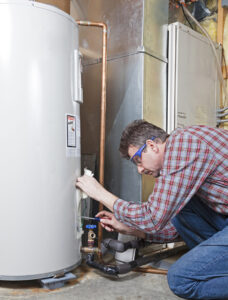
A leaking hot water heater can become a serious problem very quickly—here’s how to deal with it quickly!
A leaking hot water heater can be a homeowner’s nightmare. Not only can it cause water damage to your property, but it can also disrupt your daily routines. Whether it’s a slow drip or a sudden gush, addressing the issue promptly is essential to prevent further damage and ensure the safety of your home.
Assess the Situation
The first step when you notice a leak from your hot water heater is to assess the situation carefully. Determine the severity of the leak and whether it’s a slow drip or a significant rupture. If the leak is minor, you may have some time to address it before it causes extensive damage. However, if it’s a major leak, you’ll need to act swiftly to minimize the impact.
Turn Off the Power and Water Supply
Safety should be your top priority when dealing with a leaking hot water heater. If you have an electric water heater, switch off the power at the circuit breaker to prevent the risk of electrical shock. For gas water heaters, turn off the gas supply to the unit. Once the power is off, locate the shut-off valve on the cold water supply line leading to the water heater and turn it off to stop the flow of water.
Contain the Leak
If the leak is minor, place a bucket or container underneath the leaking area to catch the water and prevent it from spreading. You can also use towels or rags to soak up any water on the floor and prevent it from seeping into the surrounding area. This temporary measure will help contain the leak until you can address it more effectively.
Identify the Source of the Leak
Next, try to determine the source of the leak. Common areas where hot water heaters may leak include the pressure relief valve, drain valve, inlet and outlet connections, and the tank itself. Carefully inspect each component to identify any visible signs of damage or corrosion. Keep in mind that some leaks may be hidden or difficult to detect, so thorough inspection is essential.
Attempt Temporary Repairs
In some cases, you may be able to make temporary repairs to stop or reduce the leak until you can arrange for professional assistance. For example, if the leak is coming from a loose connection, you can try tightening the fittings using a wrench. Similarly, if the pressure relief valve is leaking, you may be able to replace it temporarily with a new valve until a permanent fix can be implemented.
Call a Professional
While temporary repairs may provide a temporary solution, it’s essential to call a qualified plumber or HVAC technician to assess the situation and make the necessary repairs. Leaking hot water heaters often require professional expertise to diagnose and fix the issue properly. Attempting DIY repairs without the necessary knowledge and experience can lead to further damage or safety hazards.
Consider Replacement
In some cases, especially if your hot water heater is old or extensively damaged, repair may not be a viable option. In such instances, it may be more cost-effective to replace the unit altogether. A qualified technician can help you determine whether repair or replacement is the best course of action based on the extent of the damage and the condition of the water heater.
Preventive Maintenance
Once the leak has been addressed, it’s essential to schedule regular preventive maintenance for your hot water heater to prevent future issues. This includes flushing the tank to remove sediment buildup, checking for signs of corrosion or wear, and inspecting all components for potential leaks or damage. Regular maintenance can extend the lifespan of your water heater and reduce the likelihood of unexpected breakdowns.
Call Mahon Plumbing Today
If you still have more questions regarding your plumbing, we here at Mahon Plumbing are here to help. We have been serving the wider Baltimore area since 1994, so we have 25 years of experience to back up our fantastic service! Call us at our Baltimore location at 410-766-8566 or our Pasadena location at 410-636-7944. Be sure to keep up with us on social media by following us on Facebook or Twitter.
